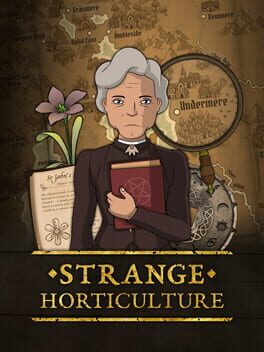Do you ever find yourself thinking "What if Obra Dinn and Papers, Please had a child that was really into botany?" No? Well, me neither, to be honest, but maybe we should have, as there's something good in that idea.
In an isolated corner of the town of Undermere stands a small plant shop named the Strange Horticulture. Players take on the role of the owner of that shop, a botanist who spends their days tending to their rare plants and fulfilling clients' requests -- and of course, looking out for the opportunity to acquire new plants. The twist is that no plant that comes into the shopkeeper's hands is labeled: armed with an almanac that loosely describes a variety of plants, as well as a map of the region and their own sharp observational skills, the player must cross-reference information from different sources to deduce the names of each plant.
It's like nothing I've ever seen before, and I can only describe as an inventive subversion of the detective game genre: at the shopkeeper's desk, the player will shuffle plants and papers back and forth in an attempt to adequately label each one, meeting each customer's demand. Multiple tricks are employed along the way, such as plants that have multiple names or deceitful appearances, or clients that aren't explicit about what they want, and each successful identification in face of all those hurdles feels rewarding.
There's more to Strange Horticulture than that, though: the shop will periodically receive cryptic letters and notes, and some of the clients will drop off texts that present challenging puzzles to be deciphered. Furthermore, over the course of the days in which the game takes place, a story will be revealed through the shop's customers, one that begins with a grizzly murder taking place to the north of Undermere and evolves into something ever more sinister.
During some of the in-game days, the player is invited to decide between a couple of possible solutions to the problems they are met with, which ultimately affects the conclusion of an NPC's story or the ending to the game. There's a bit of replayability in exploring those branching paths, even if one happens to get into labeling their plant collection incredibly hard and can name them by heart on a second playthrough, like some people (it's me, I'm people).
As a bonus, despite being designed around a mouse-based interface, it has well-thought out controller support and plays very well on the Steam Deck. Bottom line: Strange Horticulture was a very pleasant surprise, one that delivered from beginning to end. Maybe it won't click for everyone as it did for me, but it definitely warrants a try.
In an isolated corner of the town of Undermere stands a small plant shop named the Strange Horticulture. Players take on the role of the owner of that shop, a botanist who spends their days tending to their rare plants and fulfilling clients' requests -- and of course, looking out for the opportunity to acquire new plants. The twist is that no plant that comes into the shopkeeper's hands is labeled: armed with an almanac that loosely describes a variety of plants, as well as a map of the region and their own sharp observational skills, the player must cross-reference information from different sources to deduce the names of each plant.
It's like nothing I've ever seen before, and I can only describe as an inventive subversion of the detective game genre: at the shopkeeper's desk, the player will shuffle plants and papers back and forth in an attempt to adequately label each one, meeting each customer's demand. Multiple tricks are employed along the way, such as plants that have multiple names or deceitful appearances, or clients that aren't explicit about what they want, and each successful identification in face of all those hurdles feels rewarding.
There's more to Strange Horticulture than that, though: the shop will periodically receive cryptic letters and notes, and some of the clients will drop off texts that present challenging puzzles to be deciphered. Furthermore, over the course of the days in which the game takes place, a story will be revealed through the shop's customers, one that begins with a grizzly murder taking place to the north of Undermere and evolves into something ever more sinister.
During some of the in-game days, the player is invited to decide between a couple of possible solutions to the problems they are met with, which ultimately affects the conclusion of an NPC's story or the ending to the game. There's a bit of replayability in exploring those branching paths, even if one happens to get into labeling their plant collection incredibly hard and can name them by heart on a second playthrough, like some people (it's me, I'm people).
As a bonus, despite being designed around a mouse-based interface, it has well-thought out controller support and plays very well on the Steam Deck. Bottom line: Strange Horticulture was a very pleasant surprise, one that delivered from beginning to end. Maybe it won't click for everyone as it did for me, but it definitely warrants a try.
